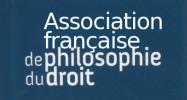Paper's abstract
Joëlle
Proust,
Free Will : A Neurophilosophical Viewpoint
Determinism entails that there is no free will, that we have no power to do otherwise ; reciprocally, having the capacity to do otherwise entails that determinism does not hold at the moment, if any, when one exercises this capacity. However, the matter of responsibility makes it difficult to accept that agents cannot do otherwise, and creates a strong motivation for making determinism and free will compatible, or for arguing, in an "incompatibilist" vein, that the human brain is not subject to deterministic laws. Libertarianism, i.e., the view that human agency allows exceptions to causal deter-mi-nism to occur in mind-brain activity, is shown to be untenable in the light of current evidence about human cognition. Compatibilism is the view that an agent with no power to do otherwise can still enjoy Free Will. Harry Frankfurt’s theory of a layered will is critically discussed. Neuroscientific evidence is offered in favor of a cascade model of the will in Frankfurt’s spirit. This model allows a form of compati-bilism to emerge, in which an agent may be more or less in control of what she does, more or less dependent on her environment, and thereby have a will that is more or less free.
Key Words : compatibilism, responsibility, libertarianism, desire, Haggard, Libet, Koechlin
tome 55, 2012: p.79-95
